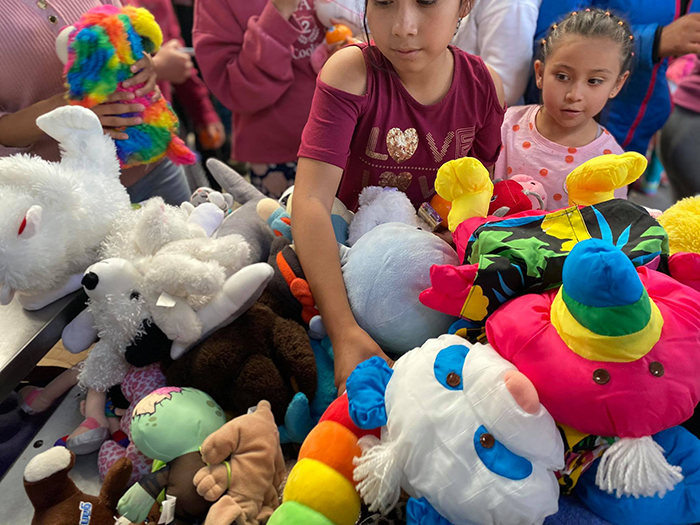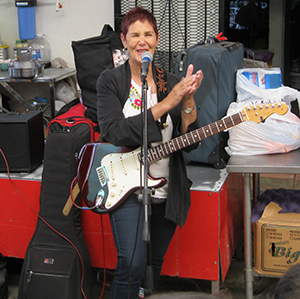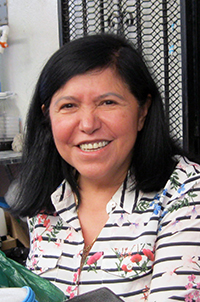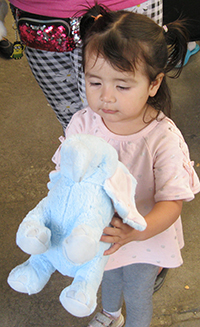
By Mimi Pollack

TIJUANA, Mexico — Saturday, May 15th was Teacher’s Day in Mexico. Teachers were celebrated all over the country. As a retired teacher, I found it the perfect day to go to Tijuana on a delivery run to a migrant shelter built on a canyon in a poorer neighborhood. My friends, Alba Orr who is retired from Grossmont College and Juan Martin Sajche, a Spanish teacher at Morse High School, and I met at my home at 9 a.m.. We filled two cars up with large bags of stuffed animals, different snacks, mandarins, juice boxes, and school supplies thanks to many generous donors.
Getting there and getting home was a lesson in patience. It took us an hour to cross into Mexico with cars cutting in, honking, and frustration. When we finally got to the line, we sailed through. If we had known we weren’t going to be stopped, we might have brought even more as there were a few bags left in my garage!

We drove through the streets of Tijuana and arrived at a building with steep ascending steps. It is literally built on a canyon. The shelter, Pro Amore Dei, is run by a kind, efficient woman named Leticia [Lety] Herrera. Although numbers fluctuate, the shelter has between 120-170 people. I saw family units, single moms, and unaccompanied minors. There were many children and teens. The ones I spoke to were from Mexico, Guatemala, El Salvador, and Honduras. Some were escaping gang violence, death threats, and abject poverty.
Because we were late in arriving at the shelter, Sharon Katz, came to our rescue. A very talented South African musician who lives in Tijuana, known familiarly as “TJ”, she had agreed to give a mini-concert and play her guitar and sing for everyone. So,she started early and she kept everyone very entertained as they clapped hands and sang with her. What struck me was how at ease everyone was. The place truly felt like a big family and a refuge. Yes, there was some chaos, but that is to be expected.

After Sharon stopped playing, Lety, Juan Martin, his wife, Angelica, and some volunteers, set up a table with the stuffed animals and the snacks. Lety then asked everyone to get into two lines. Everyone lined up and the kids’ eyes lit up as they got to choose a stuffed animal. There was plenty for everyone and even a few adults asked if they could have a stuffed animal, too.
I also liked the fact that Lety told me that when they have a surplus of food or items, they give them to the makeshift migrant camp, set up right near the border, called El Chaparral. People there live in tents as they wait for their opportunity to meet with U.S. Immigration officials.

Juan Martin lives in Tijuana, so Alba and I came back to the U.S. side of the border without him. Before we fed a few of the many stray dogs. We paid a friendly shop owner sitting on his steps and he brought out dog food for us. There was a fairly nice looking German shepherd who was scared to death of people and cars, but we managed to feed him. What really killed us though were the so called purebred puppies several men were carrying around and selling at the border lines.
I have some karma with always getting lost in TJ and that day was no exception. We were not able to find the entrance to the Ready Lanes as the one we found was blocked off. Thus, we had to get into the general line and we waited two and a half hours to cross back into San Diego.
The lines were knee deep in vendors, and we started chatting with them. Some were friendly and talked quite a bit even if we didn’t buy; whereas, others seemed desperate. Alba bought a beautiful blanket from Oaxaca and we both purchased tamales. We also gave away quite a few dollar bills as well as some cheese and Ritz crackers and bottles of water that Alba had brought. I had brought a bag of pretzels for us to munch on and several folks asked us for our bag of pretzels. The pretzels were quite coveted for some reason.
There was a group of Haitian vendors and one woman who spoke French told me she had been in TJ for 10 months. Many Haitians have settled in TJ and they make their living in various ways, including selling at border lines. These are migrants that could not get asylum, so they now have a community in Tijuana.
Going to Tijuana was soul satisfying as well as sad. However, we all plan on going back and returning to the shelter.
*
Mimi Pollack is a freelance writer based in La Mesa, California. She may be contacted via mimi.pollack@sdjewishworld.com
Hi Mimi–Karen here. Sara shared your account with us, and we enjoyed reading about all the wonderful people you encountered… and acknowledge the sadness one must feel not to be able to share more. Yours is the best approach to dealing with the difficult problems in this irritating world. We respect what you do. Best!
Thanks so much! Very interesting! You are doing a mitzvah, Mimi!
Mimi you are great and so are your friends. I am proud of you, and everyone.
Fallo
Mimi, as always an interesting and well done article. Loved the photo of the little girl with her new friend. Such a nice thing for you and Alba to take on. You are very brave driving down there and having to deal with those lines entering and particularly going back. Next time I have an opportunity to buy some snacks and perhaps stuffed animals, I’ll try and get some for your next trip back.
Be well and please tell Alba hi from me!
Susan